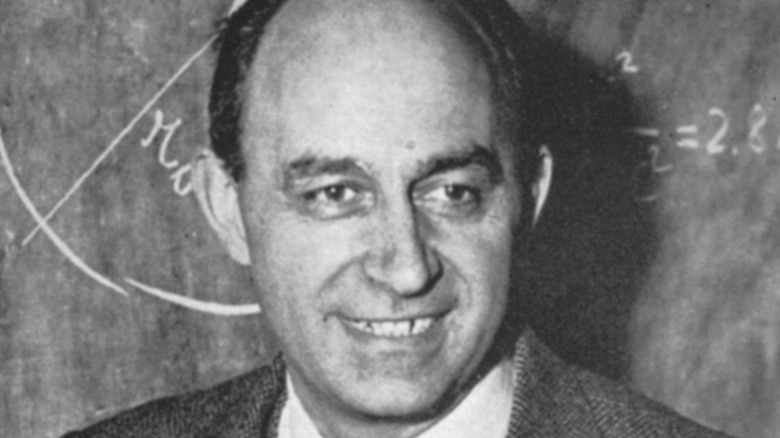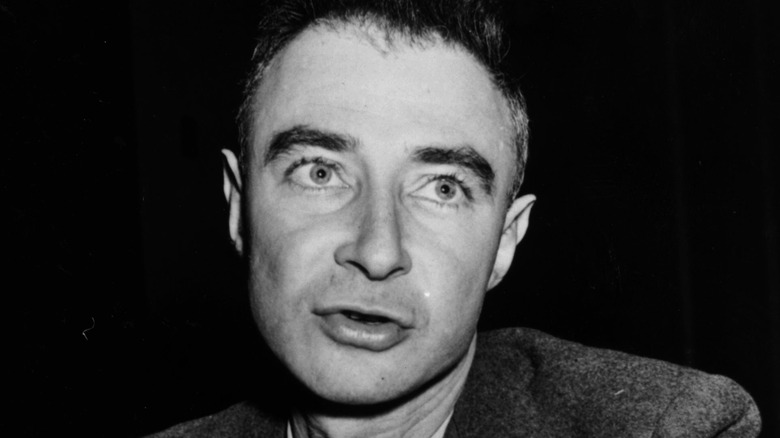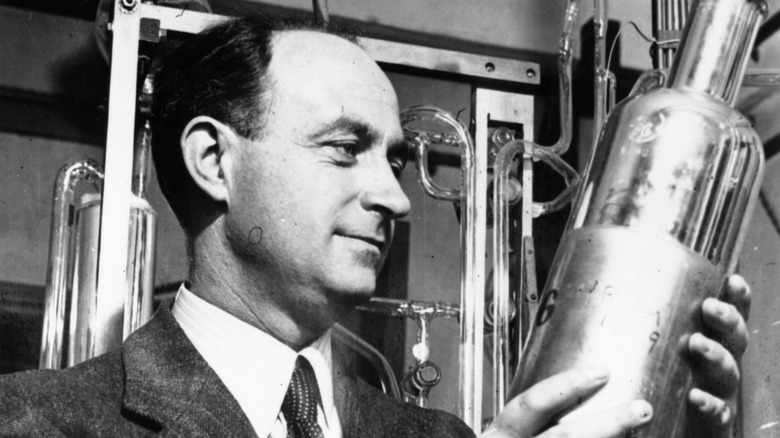Robert Oppenheimer's Partnership With The Father Of The Nuclear Age, Enrico Fermi, Explained
Theoretical physicist J. Robert Oppenheimer is known as the "father of the atomic bomb," according to Atomic Heritage. In the 1940s, under the "Manhattan Project" staged in Los Alamos, New Mexico, Oppenheimer and his team, including Nobel Prize-winning physicist Enrico Fermi, detonated the first nuclear weapon. In doing so, those scientists changed the course of world history. The subsequent dropping of two atomic bombs on Japan played an integral part in ending World War II, and advancement in nuclear armaments led to a decades-long Cold War standoff between the U.S. and Russia. The after affects of that mostly diplomatic conflict are still felt to this day, per History.
Oppenheimer was not alone in the development of atomic weaponry. Another key figure was the Italian-born scientist Fermi on the Manhattan Project team, as Britannica notes. A core principle of nuclear energy, in fact, was first demonstrated not by Oppenheimer but by Fermi beneath the University of Chicago's football field in 1942; far from New Mexico and some three years before the Manhattan Project's detonation took place. Details of Fermi's contribution to atomic energy and a closer look at Fermi's relationship with Oppenheimer in the Manhattan Project lead some to believe that Oppenheimer's designation as the "father of the atomic bomb" should be reconsidered, according to Smithsonian Magazine.
The Manhattan Project was established in 1942
What Fermi proved under that football field on December Day in 1942 was sustained energy could be released from the uranium atom through a chain reaction, crucial for both nuclear energy and an atomic weapon, as Smithsonian Magazine goes on to note. Up to that point, research in nuclear energy was ongoing, and interest in the harnessing of nuclear energy by the U.S. government for both power and defense waxed and waned. It gained some added fervency once the U.S. entered World War II post-Pearl Harbor, according to History.
Around that same time, U.S. officials believed that German scientists were already hard at work on something similar. In an effort to gain the upper hand, the Manhattan Project was formed by the Roosevelt Administration in 1942 to bolster U.S. research on the topic. Put in charge of the Manhattan Project, was Oppenheimer (pictured), the son of German immigrants, per Britannica. At that time, Oppenheimer, like Fermi, was among a number of scientists from across the U.S. who studied nuclear fission, among other central tenets of nuclear power and weaponry (via History). Many of those individuals, including Fermi, were brought on to the Manhattan Project.
Fermi was recruited into the Manhattan Project by Oppenheimer
Having served with Oppenheimer on the General Advisory Committee for the Atomic Energy Commission since 1938, Fermi was recruited by Oppenheimer onto the Manhattan Project team. By 1944, Fermi was put in charge of the Los Alamos laboratory, according to Atomic Heritage. In 1945, under Fermi's direction, the Los Alamos team detonated America's first atomic bomb in what would come to be known as the "Trinity Test." That explosion created a mushroom cloud some 40,000 feet across with the blast of some 20,000 tons of TNT, as History elsewhere notes.
Though Oppenheimer's official designation was as the head of the Manhattan Project, which has led some to call him the "father of the atomic bomb," Fermi's role in charge of the New Mexico laboratory, his early work on successful nuclear reaction in Chicago, and his role in the Trinity Test lead some to believe that it's Fermi instead of Oppenheimer who should be credited with the accomplishment instead, as Smithsonian Magazine goes on to note. Post-World War II, Oppenheimer worked to restrain the further advancement of nuclear weapons, per Stanford. Less is known about Fermi's stance on it, but after 1951, he never again worked for the government (via Smithsonian). A trailer for director Christopher Nolan's biopic "Oppenheimer" starring Cillian Murphy as Oppenheimer and Danny Deferrari as Fermi, is available to watch now on YouTube (via IMDb).


